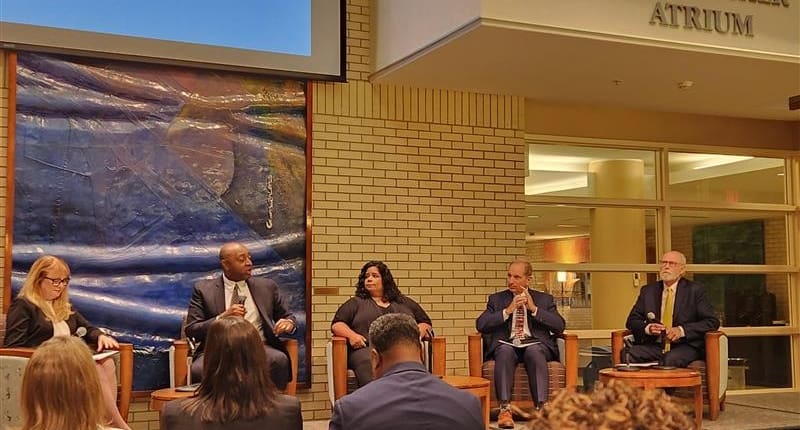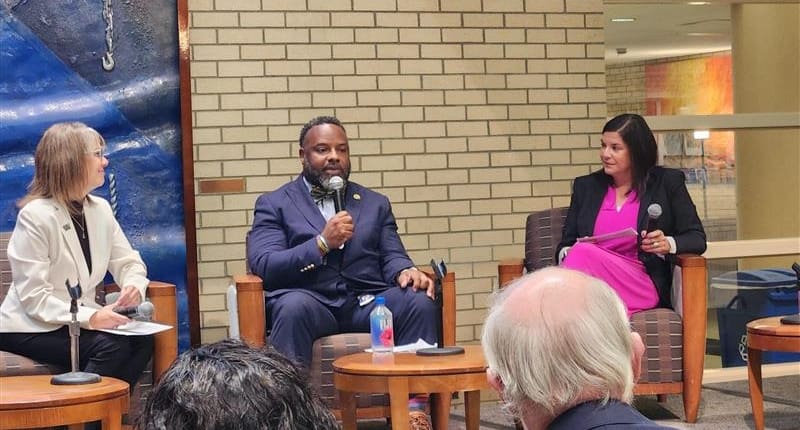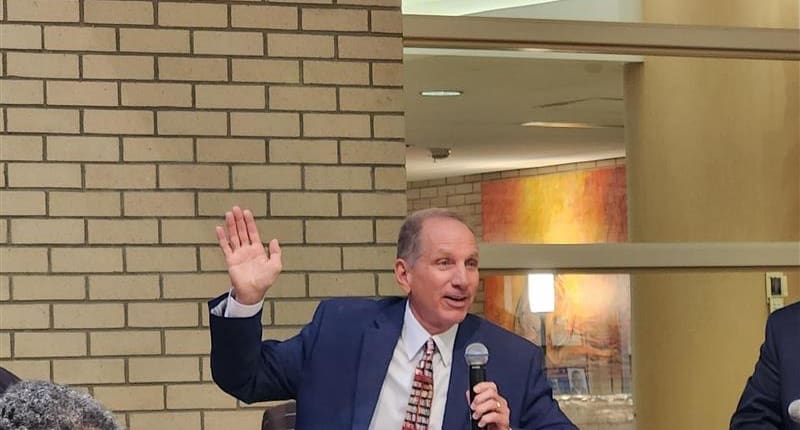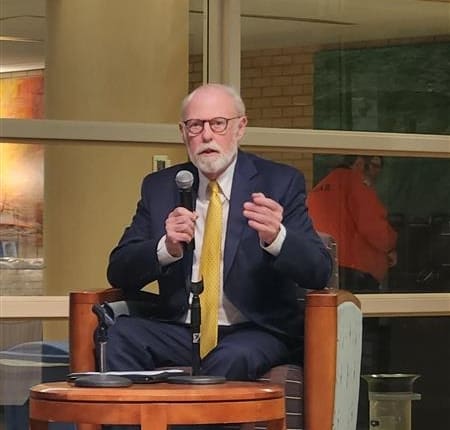Embracing the Science of Reading: Insights from Mayor Bibb’s Northeast Ohio Science of Reading Summit
At the recent Northeast Ohio Science of Reading Summit, hosted by Cleveland Mayor Justin Bibb at Cleveland State University, key leaders and educators gathered to discuss transformative changes happening in early childhood and K-12 classrooms. The summit spotlighted the crucial shift toward strategies informed by the science of reading research, highlighting the importance of early and effective literacy instruction.
Mayor Bibb emphasized the significant changes on the horizon for Ohio schools, driven by the state mandate to adopt updated instructional methods. While much is being made of the updated approach to teaching phonics, this is just one piece of the science of reading. According to literacy expert Dr. Louisa Moats, “The science of reading covers much more than phonics. Teaching reading is a complex process that incorporates decades of research into how students learn and how reading should be taught. This involves a variety of skills in both decoding (word recognition) and language comprehension. Since the reading wars, we know more than ever before about how children learn to read, causes of reading difficulties and how to prevent them, and the essential components of effective reading instruction.” All teachers will receive training about the science of reading, and community partners will collaborate closely with educators to ensure a smooth transition. By the end of the school year, districts are expected to fully implement these science of reading strategies.
Steve Dackin, Director of the Ohio Department of Education and Workforce, highlighted the urgency of the situation: “We have about 300,000 [Ohio] students in K-3 who are not reading at grade level, and I don’t see how anybody can not see that as a crisis.”
Literacy experts reference the five components of reading that all need to be addressed to build strong readers:
- Phonemic awareness: The ability to focus on and manipulate phonemes, the smallest units of speech that makeup words
- Phonics: The relationship between the print letters (or letter combinations) and the individual sounds in spoken language
- Fluency: The ability to read accurately, quickly, and with proper expression and comprehension
- Vocabulary: The ability to understand the meanings of words and how to use them in different contexts
- Comprehension: The ability to understand what is being read
Kelly Stukus, Director of Teaching and Learning at the Educational Service Center of Northeast Ohio and also a presenter at the summit elaborated by noting that, “we want our students to be able to read the words. Word recognition and phonics are important. We also want them to be able to access the meaning of the words — vocabulary. We want them to be able to work out the syntactic sense of the sentence –comprehension. We want them to be able to integrate the meanings within and between the sentences –inferencing. And we want them to be able to incorporate their background knowledge to understand what’s not explicitly stated in the text. It is much more than phonics.” In addition, the approach to teaching phonics is far different than the phonics some of us might remember, updated to be more engaging, effective and beneficial for all students, even those mastering reading early. Thus, the hope is that with updated and improved strategies, learning will be more engaging and joyful for all students.
Ensuring children have a strong literacy and language foundation and exposure to high-quality books, reading and learning before they enter kindergarten is also critical to improving the outcomes for children in Ohio. Since human brains are wired for spoken language, not reading and writing, we need to create the wiring in the brain to support the learning process and mastery of the five components listed above. The best time to do that is in the first few years of life, by providing enriching literacy and language experiences from birth, including reading high-quality books to children.
Bob Paponetti, President and CEO of The Literacy Cooperative (TLC), Kurt Karakul, a TLC board member, and Donald Jolly, a TLC board member and Superintendent for Warrensville Heights School District shared their insights at this event. Paponetti reflected on TLC’s longstanding commitment to early literacy initiatives, stressing the importance of preparing children before they start kindergarten. He shared how TLC’s board initially tasked him with finding an intervention to improve kindergarten readiness, which is a strong predictor of later academic success. The SPARK Program (Supporting Partnerships to Assure Ready Kids), developed in Canton, Ohio, was identified as a key solution. SPARK assists children ages 3 and 4 in preparing for kindergarten through monthly home visits and parental support.
TLC introduced SPARK to Cuyahoga County as a pilot program in 2011, partnering with Family Connections to deliver it. Evaluations showed that families involved in SPARK were more likely to be ready for kindergarten. The program later transitioned to Invest In Children, where it continues to make a difference.
Paponetti also touched on the critical early years of brain development, noting that over 85% of a child’s brain volume is built in the first 1,000 days. “What happens in the first three years of a child’s life has lifelong consequences,” he said. He emphasized the importance of getting it right from the start rather than trying to fix it later.
TLC is the lead local program partner for Dolly Parton’s Imagination Library in Cuyahoga County. This initiative, available to every child under age 5 in Ohio, mails a new, age-appropriate, high-quality book to over 39,000 local children each month, fostering a love of books, reading, and learning from an early age. Studies show a positive link between participation in this program and better kindergarten readiness. The longer a child is enrolled, the more they benefit.
Paponetti stated, “TLC plans to expand our communications with families to include tips and techniques and in-person training sessions to help parents build the educational foundation of their child.” These efforts are designed to ensure that parents can effectively prepare their children for kindergarten, so they start school ready to learn to read and fully benefit from the new science of reading curriculum.
The summit served as a powerful reminder of the collective responsibility we share in advancing literacy and supporting our youngest learners. As we embrace these new approaches and strengthen our community efforts, we move closer to ensuring that every child is equipped with the tools they need to succeed.




